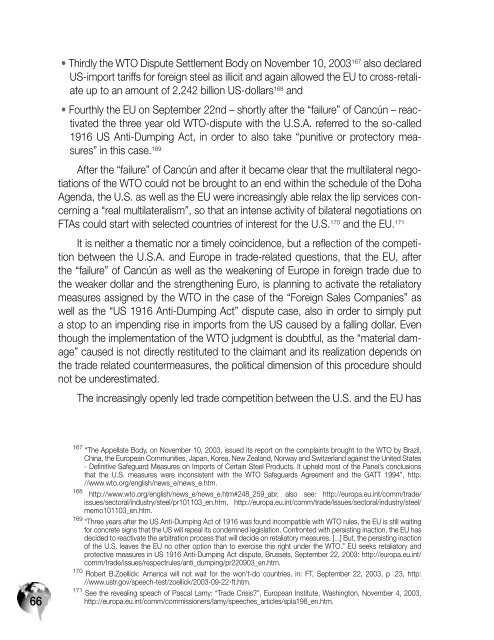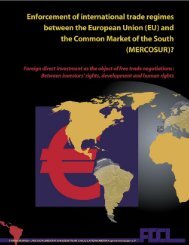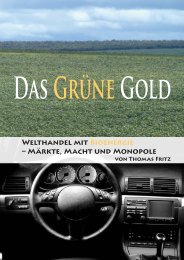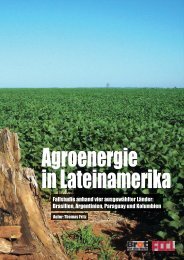(EU) and the Common Market of the South (MERCOSUR)? - FDCL
(EU) and the Common Market of the South (MERCOSUR)? - FDCL
(EU) and the Common Market of the South (MERCOSUR)? - FDCL
You also want an ePaper? Increase the reach of your titles
YUMPU automatically turns print PDFs into web optimized ePapers that Google loves.
66<br />
• Thirdly <strong>the</strong> WTO Dispute Settlement Body on November 10, 2003 167 also declared<br />
US-import tariffs for foreign steel as illicit <strong>and</strong> again allowed <strong>the</strong> <strong>EU</strong> to cross-retaliate<br />
up to an amount <strong>of</strong> 2.242 billion US-dollars 168 <strong>and</strong><br />
• Fourthly <strong>the</strong> <strong>EU</strong> on September 22nd – shortly after <strong>the</strong> “failure” <strong>of</strong> Cancún – reactivated<br />
<strong>the</strong> three year old WTO-dispute with <strong>the</strong> U.S.A. referred to <strong>the</strong> so-called<br />
1916 US Anti-Dumping Act, in order to also take “punitive or protectory measures”<br />
in this case. 169<br />
After <strong>the</strong> “failure” <strong>of</strong> Cancún <strong>and</strong> after it became clear that <strong>the</strong> multilateral negotiations<br />
<strong>of</strong> <strong>the</strong> WTO could not be brought to an end within <strong>the</strong> schedule <strong>of</strong> <strong>the</strong> Doha<br />
Agenda, <strong>the</strong> U.S. as well as <strong>the</strong> <strong>EU</strong> were increasingly able relax <strong>the</strong> lip services concerning<br />
a “real multilateralism”, so that an intense activity <strong>of</strong> bilateral negotiations on<br />
FTAs could start with selected countries <strong>of</strong> interest for <strong>the</strong> U.S. 170 <strong>and</strong> <strong>the</strong> <strong>EU</strong>. 171<br />
It is nei<strong>the</strong>r a <strong>the</strong>matic nor a timely coincidence, but a reflection <strong>of</strong> <strong>the</strong> competition<br />
between <strong>the</strong> U.S.A. <strong>and</strong> Europe in trade-related questions, that <strong>the</strong> <strong>EU</strong>, after<br />
<strong>the</strong> “failure” <strong>of</strong> Cancún as well as <strong>the</strong> weakening <strong>of</strong> Europe in foreign trade due to<br />
<strong>the</strong> weaker dollar <strong>and</strong> <strong>the</strong> streng<strong>the</strong>ning Euro, is planning to activate <strong>the</strong> retaliatory<br />
measures assigned by <strong>the</strong> WTO in <strong>the</strong> case <strong>of</strong> <strong>the</strong> “Foreign Sales Companies” as<br />
well as <strong>the</strong> “US 1916 Anti-Dumping Act” dispute case, also in order to simply put<br />
a stop to an impending rise in imports from <strong>the</strong> US caused by a falling dollar. Even<br />
though <strong>the</strong> implementation <strong>of</strong> <strong>the</strong> WTO judgment is doubtful, as <strong>the</strong> “material damage”<br />
caused is not directly restituted to <strong>the</strong> claimant <strong>and</strong> its realization depends on<br />
<strong>the</strong> trade related countermeasures, <strong>the</strong> political dimension <strong>of</strong> this procedure should<br />
not be underestimated.<br />
The increasingly openly led trade competition between <strong>the</strong> U.S. <strong>and</strong> <strong>the</strong> <strong>EU</strong> has<br />
167 “The Appellate Body, on November 10, 2003, issued its report on <strong>the</strong> complaints brought to <strong>the</strong> WTO by Brazil,<br />
China, <strong>the</strong> European Communities, Japan, Korea, New Zeal<strong>and</strong>, Norway <strong>and</strong> Switzerl<strong>and</strong> against <strong>the</strong> United States<br />
- Definitive Safeguard Measures on Imports <strong>of</strong> Certain Steel Products. It upheld most <strong>of</strong> <strong>the</strong> Panel’s conclusions<br />
that <strong>the</strong> U.S. measures were inconsistent with <strong>the</strong> WTO Safeguards Agreement <strong>and</strong> <strong>the</strong> GATT 1994”, http:<br />
//www.wto.org/english/news_e/news_e.htm.<br />
168 http://www.wto.org/english/news_e/news_e.htm#248_259_abr, also see: http://europa.eu.int/comm/trade/<br />
issues/sectoral/industry/steel/pr101103_en.htm, http://europa.eu.int/comm/trade/issues/sectoral/industry/steel/<br />
memo101103_en.htm.<br />
169 “Three years after <strong>the</strong> US Anti-Dumping Act <strong>of</strong> 1916 was found incompatible with WTO rules, <strong>the</strong> <strong>EU</strong> is still waiting<br />
for concrete signs that <strong>the</strong> US will repeal its condemned legislation. Confronted with persisting inaction, <strong>the</strong> <strong>EU</strong> has<br />
decided to reactivate <strong>the</strong> arbitration process that will decide on retaliatory measures. [...] But, <strong>the</strong> persisting inaction<br />
<strong>of</strong> <strong>the</strong> U.S. leaves <strong>the</strong> <strong>EU</strong> no o<strong>the</strong>r option than to exercise this right under <strong>the</strong> WTO.” <strong>EU</strong> seeks retaliatory <strong>and</strong><br />
protective measures in US 1916 Anti-Dumping Act dispute, Brussels, September 22, 2003: http://europa.eu.int/<br />
comm/trade/issues/respectrules/anti_dumping/pr220903_en.htm.<br />
170 Robert B.Zoellick: America will not wait for <strong>the</strong> won’t-do countries, in: FT, September 22, 2003, p .23, http:<br />
//www.ustr.gov/speech-test/zoellick/2003-09-22-ft.htm.<br />
171 See <strong>the</strong> revealing speach <strong>of</strong> Pascal Lamy: “Trade Crisis?”, European Institute, Washington, November 4, 2003,<br />
http://europa.eu.int/comm/commissioners/lamy/speeches_articles/spla198_en.htm.









